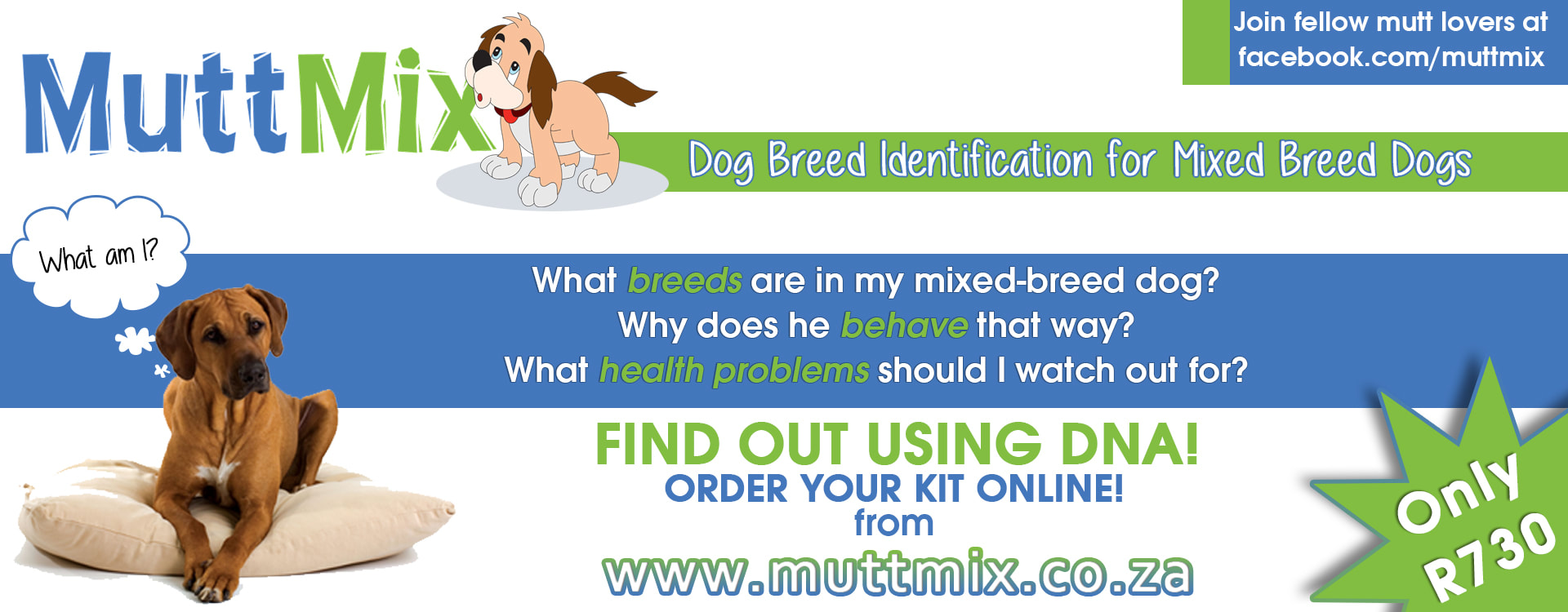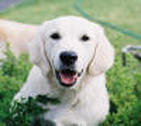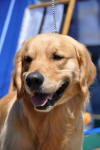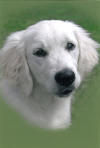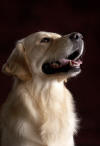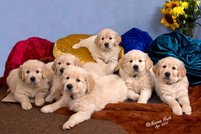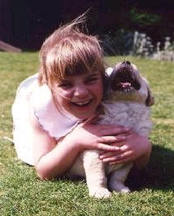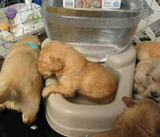The Golden Retriever
by Arnel Sauer - www.goldens.co.za - KUSA Registered Breeder
FIRST I would like to encourage you to look at the option of adopting a dog from the local SPCA or Animal Shelters because these dogs need loving homes and many are overlooked because they are not "pure-bred". It has been proven over and over that many a rescue dog has so much to offer - if they are just given the chance and opportunity! I am offering assistance with choosing a suitable rescue dog for your home by doing temperament assessments and evaluating the dog beforehand - and I will also refer dogs that I am not sure of to other animal behaviourists. Even if you have your heart set on a Golden, perhaps consider getting a "friend" for your puppy from the shelter. These dogs are being killed on a daily basis just for being ALIVE and we would like to promote MORE awareness to the plight of these animals & encourage people to look at rescue dogs as well. "Arnel Sauer"
I don't want a show dog, I want a pet, do you ever have pets available?
The most important job that any dog has is to be a good pet!
There are several qualities that a dog needs to have to be a good pet. It should be healthy and well-socialized (to children, other people, and other animals). In addition, it should grow up to look and act like what you would expect of a dog of that breed- after all, you chose a breed based on the characteristics that it should have. A Golden Retriever puppy should grow up to be 35 - 42kg, trainable, loves everyone and can play all day. It should not grow up to be a 40kg dog that fights with other dogs, hates kids, cannot be housebroken, or worse.
Anyone who buys a dog as a family pet wants to ensure that the dog is healthy. Responsible breeders will ensure this by doing the proper genetic testing to ensure that the parents of their puppies are healthy.
Your best chances of getting a healthy puppy are to buy one from someone whose motivation for breeding is to produce the finest possible dogs. That means someone who breeds only dogs that are themselves good pets and good representatives of what their breed should be. It also means someone who tests their dogs to make sure that they are free from any genetic defects before they are bred (and saying 'my vet says they are healthy', isn't good enough). It means someone who knows the background of their dogs well enough to know what they should produce.
In most cases, the people who are truly responsible breeders do show and/or work their dogs, in order to determine that they do indeed resemble the breed that they are supposed to be. Show and performance events are how responsible breeders make sure that their dogs both look and act how their breeds are supposed to look and act. .
Every litter of "show puppies" has some dogs that will never see the show ring. They may be half inch too big, half an inch to small, or have a slight overbite. These pups have been raised with as much planning, medical attention and socialization as their show-quality littermates. They make the best possible pets.
I don't want a show dog, I want a pet, do you ever have pets available?
The most important job that any dog has is to be a good pet!
There are several qualities that a dog needs to have to be a good pet. It should be healthy and well-socialized (to children, other people, and other animals). In addition, it should grow up to look and act like what you would expect of a dog of that breed- after all, you chose a breed based on the characteristics that it should have. A Golden Retriever puppy should grow up to be 35 - 42kg, trainable, loves everyone and can play all day. It should not grow up to be a 40kg dog that fights with other dogs, hates kids, cannot be housebroken, or worse.
Anyone who buys a dog as a family pet wants to ensure that the dog is healthy. Responsible breeders will ensure this by doing the proper genetic testing to ensure that the parents of their puppies are healthy.
Your best chances of getting a healthy puppy are to buy one from someone whose motivation for breeding is to produce the finest possible dogs. That means someone who breeds only dogs that are themselves good pets and good representatives of what their breed should be. It also means someone who tests their dogs to make sure that they are free from any genetic defects before they are bred (and saying 'my vet says they are healthy', isn't good enough). It means someone who knows the background of their dogs well enough to know what they should produce.
In most cases, the people who are truly responsible breeders do show and/or work their dogs, in order to determine that they do indeed resemble the breed that they are supposed to be. Show and performance events are how responsible breeders make sure that their dogs both look and act how their breeds are supposed to look and act. .
Every litter of "show puppies" has some dogs that will never see the show ring. They may be half inch too big, half an inch to small, or have a slight overbite. These pups have been raised with as much planning, medical attention and socialization as their show-quality littermates. They make the best possible pets.
Where do I get my pup from?
From a KUSA Accredited breeder only that does hip and elbow xrays, eye tests and DNA tests for PRA. Always ask to see the health certificates of both parents and to see the parents. Visit the breeder and see the dogs, see where the puppies are raised, how they are raised, what interactions they are given.
Which other breeds are most compatible?
Almost any dog is compatible with a Golden Retriever, if introduced properly and the dog is of sound temperament. Goldens also live happily with cats and other species if introduced at a young a young age.
Is it wise to have two or more of the same breed?
Goldens thrive together with each other. It is not advisable to get two puppies at the same time as they tend to bond with one another and training will become more challenging.
Life expectancy. 12 to 15 years
From a KUSA Accredited breeder only that does hip and elbow xrays, eye tests and DNA tests for PRA. Always ask to see the health certificates of both parents and to see the parents. Visit the breeder and see the dogs, see where the puppies are raised, how they are raised, what interactions they are given.
Which other breeds are most compatible?
Almost any dog is compatible with a Golden Retriever, if introduced properly and the dog is of sound temperament. Goldens also live happily with cats and other species if introduced at a young a young age.
Is it wise to have two or more of the same breed?
Goldens thrive together with each other. It is not advisable to get two puppies at the same time as they tend to bond with one another and training will become more challenging.
Life expectancy. 12 to 15 years
Before acquiring a Golden Retriever it is important to determine if a Golden Retriever is the correct / suitable breed for you, your household and your lifestyle.
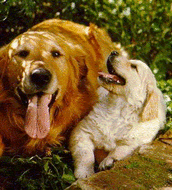
Courtesy of Arnel Sauer
Overview
The Golden is a medium-to-large size dog who requires a good bit of space indoors and out. Everything about the dog is big, including his hairy paws, which will track mud and dirt onto your floor. His happy wagging tail will sweep your prized glassware from low-standing table tops. His natural curiosity will lead to rows of nose prints on the glass above your windowsills. Given a single opportunity, he will claim at least two couch cushions or your easy chair.
Part of the Family:
Remember that your cute, fluffy puppy will grow into a large vigorous dog, who will need looking after for up to 15 years. Like a child, it depends on you to provide its nutrition, education and overall well-being. Consider the amount of time you can dedicate to your dog, the space available in your home, the cost of veterinary attention and most importantly, your dog’s essential food requirements – Goldens are among the dog world’s greatest eaters!
A Happy and Boisterous Breed:
A BOUNCING “HALLO” – If Goldens are not trained early in life to keep all four feet on the ground, you and your friends can expect a very warm welcome from this friendly but sometimes clumsy breed. Choose a Golden only if you can accept such affection and the odd broken object caused by its wagging tail
IRREPRESSIBLE RETRIEVERS – Goldens are natural retrievers who can not resist picking up stray items, especially those with an interesting odour. Consider a Golden only if you are prepared to be extra tidy, or if you are amendable to having shoes, socks, and even under garments presented to both family and friends!
A Natural Love of Water:
Although now a popular pet, Goldens were originally bred to work outdoors, retrieving in rivers and thick undergrowth. Therefore, no stream or dirty puddle can be passed without investigation, requiring you to clean your dog and your car on a regular basis
A Rewarding Companion:
If you want a good natured, sociable dog, then a Golden Retriever is ideal. Selective breeding has created this potential, but it is only through appropriate training that these desirable traits can be developed. The Golden Retriever is a lively dog that enjoys the exhilaration of outdoor activity as much as it does the relaxation of being at home. By nature, the Golden is generally placid and friendly seeking the company of other dogs or people for frivolous play. It is this affectionate, even temperament which draws most people to the breed, but if you require guarding services rather than companionship, choose another breed.
Why a Golden is NOT the Perfect Family Dog
Golden Retrievers are excellent family dogs, but the family should also take cognisance of the needs of the dog. Man and Dog has always had "Symbiotic" relationship - a lot of people do not know about this important fact and too frequently choose a dog just because they want a cute puppy, like the "look" of a specific dog without looking into the traits of the breed or doing the necessary research whether the breed they want, actually fits into their lifestyle. Goldens are GREAT with kids - but kids also need to be good to Goldens.
This is a sad situation as most dogs end up being rehomed for reasons like:
Golden Retrievers are excellent family dogs, but the family should also take cognisance of the needs of the dog. Man and Dog has always had "Symbiotic" relationship - a lot of people do not know about this important fact and too frequently choose a dog just because they want a cute puppy, like the "look" of a specific dog without looking into the traits of the breed or doing the necessary research whether the breed they want, actually fits into their lifestyle. Goldens are GREAT with kids - but kids also need to be good to Goldens.
This is a sad situation as most dogs end up being rehomed for reasons like:
The Golden is a medium-to-large size dog who requires a good bit of space indoors and out. Everything about the dog is big, including his hairy paws, which will track mud and dirt onto your floor. His happy wagging tail will sweep your prized glassware from low-standing table tops. His natural curiosity will lead to rows of nose prints on the glass above your windowsills. Given a single opportunity, he will claim at least two couch cushions or your easy chair.
Part of the Family:
Remember that your cute, fluffy puppy will grow into a large vigorous dog, who will need looking after for up to 15 years. Like a child, it depends on you to provide its nutrition, education and overall well-being. Consider the amount of time you can dedicate to your dog, the space available in your home, the cost of veterinary attention and most importantly, your dog’s essential food requirements – Goldens are among the dog world’s greatest eaters!
A Happy and Boisterous Breed:
A BOUNCING “HALLO” – If Goldens are not trained early in life to keep all four feet on the ground, you and your friends can expect a very warm welcome from this friendly but sometimes clumsy breed. Choose a Golden only if you can accept such affection and the odd broken object caused by its wagging tail
IRREPRESSIBLE RETRIEVERS – Goldens are natural retrievers who can not resist picking up stray items, especially those with an interesting odour. Consider a Golden only if you are prepared to be extra tidy, or if you are amendable to having shoes, socks, and even under garments presented to both family and friends!
A Natural Love of Water:
Although now a popular pet, Goldens were originally bred to work outdoors, retrieving in rivers and thick undergrowth. Therefore, no stream or dirty puddle can be passed without investigation, requiring you to clean your dog and your car on a regular basis
A Rewarding Companion:
If you want a good natured, sociable dog, then a Golden Retriever is ideal. Selective breeding has created this potential, but it is only through appropriate training that these desirable traits can be developed. The Golden Retriever is a lively dog that enjoys the exhilaration of outdoor activity as much as it does the relaxation of being at home. By nature, the Golden is generally placid and friendly seeking the company of other dogs or people for frivolous play. It is this affectionate, even temperament which draws most people to the breed, but if you require guarding services rather than companionship, choose another breed.
Why a Golden is NOT the Perfect Family Dog
Golden Retrievers are excellent family dogs, but the family should also take cognisance of the needs of the dog. Man and Dog has always had "Symbiotic" relationship - a lot of people do not know about this important fact and too frequently choose a dog just because they want a cute puppy, like the "look" of a specific dog without looking into the traits of the breed or doing the necessary research whether the breed they want, actually fits into their lifestyle. Goldens are GREAT with kids - but kids also need to be good to Goldens.
This is a sad situation as most dogs end up being rehomed for reasons like:
- Being garden proud - destroying the Garden
Eating & destroying valuables (mostly lying around in the house) - Not wanting to put the necessary time & effort in the maintenance of the dog - the coats need regular grooming and trimming, using the correct shampoo's or conditioners
- Not having time for training - All dogs need training - not just to make living with them easier & more pleasurable, but also for their protection and safety & as they are intelligent dogs, need to WORK ...whether this is obedience or dog breed shows, agility or training to become "Canine Good Citizens".
- A dog is a lifetime commitment - you must think of your current lifestyle now, how you expect it in 5, 10 and 15 years. If the puppy will fit into your lifestyle without any negative aspects for the dog, then half the battle is won!!
- Not having a good vacuum cleaner - Goldens are a coated breed, so they do shed & you will have hair on the couch, on your clothes, on the floor, in the car & everywhere else! Regular brushing reduce the shedding but wont stop it ever.
Golden Retrievers are excellent family dogs, but the family should also take cognisance of the needs of the dog. Man and Dog has always had "Symbiotic" relationship - a lot of people do not know about this important fact and too frequently choose a dog just because they want a cute puppy, like the "look" of a specific dog without looking into the traits of the breed or doing the necessary research whether the breed they want, actually fits into their lifestyle. Goldens are GREAT with kids - but kids also need to be good to Goldens.
This is a sad situation as most dogs end up being rehomed for reasons like:
- Being garden proud - destroying the Garden
- Eating & destroying valuables (mostly lying around in the house)
- Not wanting to put the necessary time & effort in the maintenance of the dog - the coats need regular grooming and trimming, using the correct shampoo's or conditioners
- Not having time for training - All dogs need training - not just to make living with them easier & more pleasurable, but also for their protection and safety & as they are intelligent dogs, need to WORK ...whether this is obedience or dog breed shows, agility or training to become "Canine Good Citizens".
- A dog is a lifetime commitment - you must think of your current lifestyle now, how you expect it in 5, 10 and 15 years. If the puppy will fit into your lifestyle without any negative aspects for the dog, then half the battle is won!!
- Not having a good vacuum cleaner - Goldens are a coated breed, so they do shed & you will have hair on the couch, on your clothes, on the floor, in the car & everywhere else! Regular brushing reduce the shedding but wont stop it ever.
- The Golden could suffer from major separation anxiety. Because Goldens are "people" dogs, they suffer when their people need to leave them behind, even under the best of conditions in their own home with a live-in servant. The Golden gives no hint that they are stressed until they explode with a hot spot the size of a dinner plate. If unable to work up a hot spot, the Golden will resort to a bout of diarrhoea or another ailment serious enough to require a trip to the vet as long as it does not require missing a meal.
- The Golden is first and foremost a retriever. This means that they will make every effort to bring you everything not nailed down. However, they never return anything to its original location so a large portion of the day must be spent gathering and redecorating.
- The Border Collie has "the eye", an unblinking stare that is used to get what they want. The Golden has something equally unnerving, "The Eye Shift." During The Eye Shift, the Golden darts their eyes back and forth between you and any tennis ball. This is done without any perceptible movement of their heads. The Eye Shift can be done at any angle to accommodate a ball on the floor or hidden high on a bookshelf. It is impossible to hide a ball from a Golden, and every effort to do so will be defeated. Living with the Eye Shift is like living with a non-stop tennis match. Golden Retriever owners learn to ignore it or run the risk of developing vertigo.
- When things are quiet, the Golden Retriever likes to drape in your lap or, at the very least, rest their fifty-pound head. They are big dogs and it only takes about ten minutes before your legs go numb. After watching a movie, one is reduced to crawling to bed or the kitchen or waiting until feeling returns with a painful burst of pins and needles.
- The Golden makes a terrible watchdog. They like everyone. A Golden will try to work the Eye Shift on a burglar with some patter that sounds like this: Hey, could you stop filling that bag for just a minute and toss the ball on that shelf for me, please, please, please. Yes, that shelf. Just follow my eyes. Right there. Right there. Yes!
- This breed is known for their versatility. They will do their best at any type of work they are offered. Guide Dog? Sure. Agility? Can do. Obedience? How long should I stay? Tracking. Where shall we start? This puts great responsibility on the Golden owner to get involved in something. Goldens make their owners feel guilty or at least they should.
- The breed has fragmented into at least two distinctly different types that look strikingly different. The lighter boned, darker coloured dogs bred to work in the field look very different than their show bred relatives with their Hollywood starlet blond coats and heavier bone. If you decide on a Golden, you will have to make the tough choice of whether you want to join the camp of the beauty queens or the athletes.
- This breed will sell its soul for food. Julie Cairns writes in her book, The Golden Retriever, All That Glitters that, "... gluttony is a common trait among Goldens, and many will eat as long as food is available." Now that is an understatement. A Golden who stumbles on an unattended dog food bag is a candidate for exploding. An increasing number of Goldens have been appearing on street corners sporting signs announcing that they will trade their services for food.
- The death of a Golden presents a serious problem, beyond the mere fact that they have died. When Goldens die, they are automatically transformed in their friends' minds from a perfect dog to sainthood. All deceased Goldens are known as Saint Somebody. This makes it very difficult to get another dog.
- Goldens shed their coats frequently and copiously. Do not buy one if you are house-proud, have pale coloured carpets or a dodgy vacuum cleaner.
- Goldens are large dogs with an uncanny knack of finding all the muddiest puddles. Some are great wallowers - yours is bound to be one of them!
- Faeces are a by-product of all dogs, which we all have to dispose of responsibly. It is one of the more unpleasant facts of dog ownership, and most public places now require you to pick up after your dog.
- A well-bred and properly reared puppy will cost from R5000-00 to R7000-00 and this is only the beginning. Veterinary fees are expensive, so it makes sense to get pet insurance for your dog - indeed most breeders will insist you do so.
- A male Golden Retriever will mature into a large dog, reaching as much as 56-61 cm at the shoulder and can weigh anything up to 40kg's - a sizeable amount when it is attempting to climb up into your lap for a cuddle. The female golden will have seasons every 6 - 9 months. This is a big responsibility to avoid unwanted litters & since Golden Retriever MUST live with the family in the house, this could present some issues with her discharge, that can become quite excessive.
- Goldens do not make good kennel dogs, most are real couch potatoes, who unerringly find the most comfortable sofas and the choicest position in front of the fire.
- Some Goldens are great landscape architects, if your garden is a show piece, having your own Ground Force team may not go down too well. The garden must also be well fenced with sturdy boundaries, like Anne Robinson, puppies will always find the Weakest Link.
- Although usually tractable and obedient, given an inch, most will take the whole nine yards!
Health Concerns
Golden Retrievers, like most other pure bred dogs, have a variety of diseases to which they are predisposed. Reputable breeders screen their breeding stock for health problems such as Hip Dysplasia. Although this does not exclude some problems arising, it does minimise the risk of potentially producing puppies with health problems. (This does not mean that non-purebred dogs are not at risk of developing diseases, but because of their unknown ancestry one is not aware of which disease they may be predisposed to.)
Hip and Elbow Dysplasia: Goldens, like most large breed dogs, are predisposed to Hip and Elbow Dysplasia. There are 3 roll players in this disease; Genetics, Environment and Nutrition.
Genetics: To minimise the risk of producing puppies with Hip Dysplasia, reputable breeders have their breeding stock's hips and elbows X-rayed once they reach adulthood (at 12 - 18 months of age). These X-rays are examined and scored by a radiologist. Only dogs with acceptable scores are then bred from. Unfortunately there is room for error as this is not a genetic test but merely states that the specific dog is free from radiographical changes. This does not mean that the dog is genetically free from Hip or Elbow Dysplasia merely that the dog shows no sign of the disease. At this stage there is no genetic test available for Hip or Elbow Dysplasia. See KUSA (The Kennel Union of South Africa) website for grading explanation. (under Documents: Hip and Elbow Dysplasia)
Golden Retrievers, like most other pure bred dogs, have a variety of diseases to which they are predisposed. Reputable breeders screen their breeding stock for health problems such as Hip Dysplasia. Although this does not exclude some problems arising, it does minimise the risk of potentially producing puppies with health problems. (This does not mean that non-purebred dogs are not at risk of developing diseases, but because of their unknown ancestry one is not aware of which disease they may be predisposed to.)
Hip and Elbow Dysplasia: Goldens, like most large breed dogs, are predisposed to Hip and Elbow Dysplasia. There are 3 roll players in this disease; Genetics, Environment and Nutrition.
Genetics: To minimise the risk of producing puppies with Hip Dysplasia, reputable breeders have their breeding stock's hips and elbows X-rayed once they reach adulthood (at 12 - 18 months of age). These X-rays are examined and scored by a radiologist. Only dogs with acceptable scores are then bred from. Unfortunately there is room for error as this is not a genetic test but merely states that the specific dog is free from radiographical changes. This does not mean that the dog is genetically free from Hip or Elbow Dysplasia merely that the dog shows no sign of the disease. At this stage there is no genetic test available for Hip or Elbow Dysplasia. See KUSA (The Kennel Union of South Africa) website for grading explanation. (under Documents: Hip and Elbow Dysplasia)
Environment: Environment and how the puppy is raised plays a hugely important part in whether a puppy will develop Hip and Elbow Dysplasia or not. Jumping over obstacles, in and out of cars, slipping on floors, over-exercising can all lead to a puppy developing these problems. It is therefore essential that you are cautious with a puppy's activities until it is at least 12 months old. If your puppy has an accident at this stage (like falling off something) they probably will develop a joint problem. On the other hand, Hip Dysplasia is by no means a death sentence and most Goldens with this problem cope extremely well into old age. In this day and age there are also many ways of maintaining a dog with joint problems, such as nutrition.
Nutrition: Nutrition is the other and most controllable variable in this equation. With a large breed dog one has to prevent the puppy from growing too fast and this can be done through nutrition. At Goldenzauer we feed Hill's Science Plan Large Breed Puppy and / or Eukanuba to our puppies and insist that our owners do the same. One of the most detrimental factors for Hip Dysplasia is an overweight puppy or dog. It has been proved that dogs that are overweight are 50% more likely to develop Hip Dysplasia than their littermates at ideal weight.
Eye Disease: Goldens, once again like many other breeds, are predisposed to many eye diseases as well. To avoid producing puppies with problems, reputable breeders have their breeding stock screened annually. Once again, these certificates only state that the dog in contention does not have the disease/s at the time of the screening. Unfortunately there are as yet no genetic tests available for eye diseases in Golden Retrievers (some other breeds such as Labrador Retrievers, have DNA tests available for some of the eye diseases. Although these certificates cannot assure one of never producing an affected puppy, at least by testing, reputable breeders are not breeding with affected dogs and therefore minimising the risk of producing affected puppies.
Eye Diseases that Golden Retrievers are predisposed to:
“In today’s age, with the rising cost of veterinary care, it really is a wise decision to consider medical insurance for your pets. Depending on the plan you choose, you can ensure that if your pet does develop one of the health issues the breed is prone too, that you will be covered –additionally, just knowing that any accident your pet may have will be covered, will out-weigh the monthly insurance fee for most pet owners. Our own personal choice is Genricpet as they have a ‘no limit’ policy and their rates are comparable to the rest of the industry. To find out the questions and things to look for in a Medical Insurance, please just follow this link”
Nutrition: Nutrition is the other and most controllable variable in this equation. With a large breed dog one has to prevent the puppy from growing too fast and this can be done through nutrition. At Goldenzauer we feed Hill's Science Plan Large Breed Puppy and / or Eukanuba to our puppies and insist that our owners do the same. One of the most detrimental factors for Hip Dysplasia is an overweight puppy or dog. It has been proved that dogs that are overweight are 50% more likely to develop Hip Dysplasia than their littermates at ideal weight.
Eye Disease: Goldens, once again like many other breeds, are predisposed to many eye diseases as well. To avoid producing puppies with problems, reputable breeders have their breeding stock screened annually. Once again, these certificates only state that the dog in contention does not have the disease/s at the time of the screening. Unfortunately there are as yet no genetic tests available for eye diseases in Golden Retrievers (some other breeds such as Labrador Retrievers, have DNA tests available for some of the eye diseases. Although these certificates cannot assure one of never producing an affected puppy, at least by testing, reputable breeders are not breeding with affected dogs and therefore minimising the risk of producing affected puppies.
Eye Diseases that Golden Retrievers are predisposed to:
- Ectropion: Out-turned lower eyelid exposing the conjunctiva
- Entropion: In-turned eyelid, with eyelashes rubbing on the cornea
- Cataracts: Opacity of the lens or its capsule in the eye
- Post Polar Cataracts: Cataract the size of a pin prick, will in 95% of cases not influence the eye sight
- Multifocal Retina Dysplasia: Retina with lesions (or folds) resulting from defective development
- Progressive Retinal Atrophy: Progressive destruction and loss of retinal tissue.
- Dermoid Sinus - is a genetic, autosomal skin condition in dogs. It is also known (apparently incorrectly) as pilonidal sinus because it resembles pilonidal sinus in humans. However, unlike pilonidal sinus in humans, dermoid sinus in dogs is a neural tube defect. Dermoid sinus is sometimes also confused with dermoid cyst (a teratoma).
- Allergies
- Heart Problems
- Epilepsy
- Cryptorchism - an dog with undescended testes
- Monorchism - an dog having only one testis in the scrotum
“In today’s age, with the rising cost of veterinary care, it really is a wise decision to consider medical insurance for your pets. Depending on the plan you choose, you can ensure that if your pet does develop one of the health issues the breed is prone too, that you will be covered –additionally, just knowing that any accident your pet may have will be covered, will out-weigh the monthly insurance fee for most pet owners. Our own personal choice is Genricpet as they have a ‘no limit’ policy and their rates are comparable to the rest of the industry. To find out the questions and things to look for in a Medical Insurance, please just follow this link”

